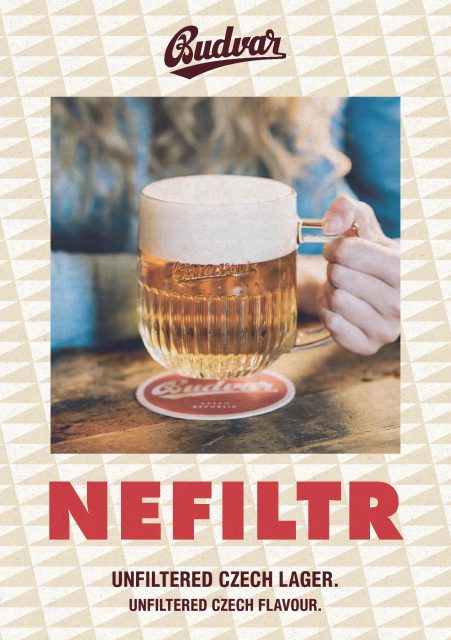This website uses cookies so that we can provide you with the best user experience possible. Cookie information is stored in your browser and performs functions such as recognising you when you return to our website and helping our team to understand which sections of the website you find most interesting and useful.
Budweiser Budvar rebrands Kraüsened as Budvar Nefiltr
Budweiser Budvar has launched a rebrand of its unfiltered and unpasteurised lager Kraüsened, renaming it Budvar Nefiltr.

The Czech beer Budvar Nefiltr, which blends mature and fresh batches to create a hazy, unfiltered 4% ABV lager, is set to be sold in the UK exclusively on draught.
According to Budweiser Budvar, the rebrand better reflects brewery’s Czech origins and amplifies in its mission to build the reputation of the Czech Republic as one of “the world’s great beer cultures”.
The name Nefiltr is also intended to highlight the beer’s unfiltered nature and set Nefiltr apart from Budvar’s core family of Czech lagers.
Budweiser Budvar UK managing director Jitka Vlčková said: “The 4% category has shown significant growth in recent years as drinkers look to enjoy the great flavour of beer without the higher alcohol content. At Budvar, we use the same four ingredients as we do for our Original, Dark and Nealko lagers: whole-cone Saaz hops from Žatec; natural, soft water from our own artesian well; Czech malting barley from Moravia; and our heritage strain of yeast. However, it is the absence of filtration that is the key to a premium, full-flavoured lager.”
Vlčková explained: “With Budvar Nefiltr, we are bringing the Czech beer culture and brewing tradition to drinkers across the UK. It’s a vivid, non-filtered beer with a fuller, complex and delicate taste. A Czech lager equivalent of a fresh real ale, available exclusively on draught”.
Budvar head brewer Adam Brož added: “Brewing Budvar Nefiltr takes skill and balance. It’s up to us to add just the right amount of fresh beer to a batch that’s finished maturing in our brewery cellars. Too much, and the second fermentation will be too fierce and will overpower the richness of the matured batch. Too little, and it won’t create the delicate carbonation we’re after.”

